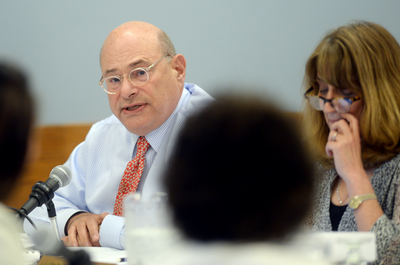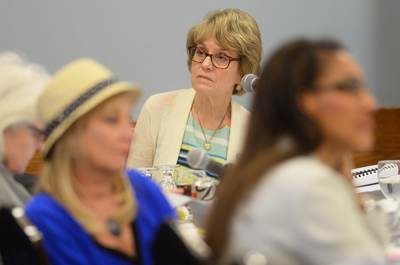The University of Michigan Board of Regents has hired a search firm to assist in finding President Mary Sue Coleman's replacement.

University of Michigan Regent Larry Deitch gave an update on the presidential search during a board meeting on Thursday, June 20, 2013 at the Michigan Union.
Melanie Maxwell | AnnArbor.com
U-M will pay the firm $300,000 and is budgeting an additional $50,000 for expenses.
"A presidential search involves two aspects: search and recruitment because it’s not a big pool of people in this country who can lead a complex place like Michigan," U-M Board of Regents chair Larry Deitch said in an interview. "So you need the professional expertise to talk to people, find candidates, vet them, reference them. So that’s why you go out to a search firm."
Deitch said he considers picking a U-M president the most important job of the school's eight-member governing board.
The process, however, can be tricky. Possible candidates don't want to make it known they're looking to move on from their current institutions.
Some candidates aren't even looking— which was the case with Coleman prior to coming to U-M in 2002. While president of the University of Iowa she was contacted by U-M's search firm at the time and asked if she would be interested in the position.

University of Michigan President Mary Sue Coleman listens during a regents meeting on Thursday, June 20, 2013 at the Michigan Union.
Melanie Maxwell | AnnArbor.com
"Part of the job involves recruitment and convincing people that this is a great opportunity, that this is a unique institution, a good place to work," Deitch said. "Because all the people you want have good jobs. Many of them are in places of the country... where there are intangible factors that would make people want to stay where they are."
Regents used a different search firm, the Chicago-based A.T. Kearney, to find Coleman. The 2002 search cost $335,000.
Russell Reynolds Associates has worked with Bucknell University, Connecticut College and several state colleges that are a part of the Association of American Universities in finding presidents and other executive leaders.
The search firm will identify and preliminarily interview candidates and prepare a list of possibilities for the board. The board will then decide who to interview and the search firm will coordinate meetings. U-M's search will be secret until the final candidate is announced and the firm will closely coordinate interviews —which will likely be held outside of Ann Arbor— so they are discrete.
Deitch said that although the board is still discussing the shape of the search, members intend it to be inclusive.
In a two-page request given to regents, a faculty senate committee on university values requested the search for U-M's next president include broad input from professors and an advisory committee that would be able to secretly interview top candidates.
"We clearly recognize that constitutionally it’s the regents responsibility," Deitch said. "But you have to be able to pick a candidate who will be broadly accepted, so that means listening to the different constituencies and getting advice from distinguished faculty."
The search that produced Coleman included a 16-member advisory committee that interviewed candidates. Finalists were whittled down from a list of more than 200 names. However members of that committee said they did not know the regents' final choice until it was publicly announced.
Kellie Woodhouse covers higher education for AnnArbor.com. Reach her at kelliewoodhouse@annarbor.com or 734-623-4602 and follow her on twitter.